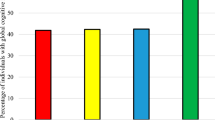Abstract
To determine the prevalence and predictors factors of depression in Moroccan patients with systemic sclerosis (SSc), we conducted a cross-sectional study of 59 Moroccan patients with systemic sclerosis. Patients were assessed by using the Patient Health Questionnaire depression scale “PHQ-9” and through extensive clinical histories and medical examinations. The Arabic version of HAQ and SF-36 was used to assess functional disability and health status, respectively. Forty-six patients (77.4%) presented symptoms of depression. Thirty six (61%) have a major depressive syndrome and 10 (16.4%) have a minor depressive syndrome. The PHQ-9 score was significantly higher in the patient with prolonged disease duration, severe joint pain, higher disease severity, and important acute-phase reactants. Also, depression had a negative impact on physical and mental scores. Systemic scleroderma is associated with a high prevalence of depression. Screening for depression among patients with SSc is recommended and it should be assessed for routinely.

Similar content being viewed by others
References
Wigley FM, Hummers LK (2003) Clinical features of systemic sclerosis. Rheumatology, 3rd edn. Mosby, Philadelphia, pp 1463–1480
Mayes MD, Lacey JV Jr, Beebe-Dimmer J, Gillespie BW, Cooper B, Laing TJ et al (2003) Prevalence, incidence, survival, and disease characteristics of systemic sclerosis in a large US population. Arthritis Rheum 48:2246–2255
Benrud-Larson LM, Heinberg LJ, Boling C, Reed J, White B, Wigley FM et al (2003) Body image dissatisfaction among women with scleroderma: extent and relationship to psychosocial function. Health Psychol 22:130–139
Thombs BD, Taillefer SS, Hudson M, Baron M (2007) Depression in patients with systemic sclerosis: a systematic review of the evidence. Arthritis Rheum 57:1089–1097
Milette K, Hudson M, Baron M, Thombs BD, Canadian Scleroderma Research Group (2010) Comparison of the PHQ-9 and CES-D depression scales in systemic sclerosis: internal consistency reliability, convergent validity and clinical correlates. Rheumatology 49(4):789–796
Radloff LS (1977) The CES-D scale: a self-report depression scale for research in general population. Appl Psychol Meas 1:385–401
LeRoy EC, Black C, Fleischmajer R, Jablonska S, Kriek T, Medsger TA Jr (1988) Scleroderma (systemic sclerosis): classification, subsets, and pathogenesis. J Rheumatol 15:202–205
Clements PJ, Seibold JR, Furst DE, Mayes M, White B, Wigley F et al (2004) High-dose versus low-dose d-penicillamine in early diffuse systemic sclerosis trial: lessons learned. Semin Arthritis Rheum 33:249–263
Clements P, Lachenbruch P, Siebold J, White B, Weiner S, Martin R et al (1995) Inter and intraobserver variability of total skin thickness score (modified Rodnan TSS) in systemic sclerosis. J Rheumatol 22:1281–1285
Steen VD, Medsger TA Jr (1997) The value of the Health Assessment Questionnaire and special patient-generated scales to demonstrate change in systemic sclerosis patients over time. Arthritis Rheum 40:1984–1991
Kroenke KS, Robert L (2002) The PHQ-9: a new depression diagnostic and severity measure. Psychiatr Ann 32:509–515
Kroenke K, Spitzer RL, Williams JB (2001) The PHQ-9: validity of a brief depression severity measure. J Gen Intern Med 16(9):606–613
Moussaoui D (2007) Psychiatry and mental health in Morocco. Bull Acad Natl Méd 191(4–5):781–782
Roca RP, Wigley FM, White B (1996) Depressive symptoms associated with scleroderma. Arthritis Rheum 39:1035–1040
Benrud-Larson LM, Haythornthwaite JA, Heinberg LJ, Boling C, Reed J, White B (2002) The impact of pain and symptoms of depression in scleroderma. Pain 95:267–275
Matsuura E, Ohta A, Kanegae F, Haruda Y, Osamu U, Koarada S (2003) Frequency and analysis of factors closely associated with the development of depressive symptoms in patients with scleroderma. J Rheumatol 30:1782–1787
Dickens C, McGowan L, Clark-Carter D, Creed F (2002) Depression in rheumatoid arthritis: a systematic review of the literature with meta-analysis. Psychosom Med 64:52–60
Omdal R, Waterloo K, KoldingsnesW HG, Mellgren SI (2003) Fatigue in patients with systemic lupus erythematosus: the psychosocial aspects. J Rheumatol 30:283–287
Thombs BD, Hudson M, Taillefer SS, Baron M, Canadian Scleroderma Research Group (2008) Prevalence and clinical correlates of symptoms of depression in patients with systemic sclerosis. Arthritis Rheum 59(4):504–509
Rkain H, Allali F, Jroundi I, Hajjaj-Hassouni N (2006) Socioeconomic impact of rheumatoid arthritis in Morocco. Joint Bone Spine 73(3):278–283
Nietert PJ, Mitchell HC, Bolster MB, Curran MY, Tilley BC, Silver RM (2005) Correlates of depression, including overall and gastrointestinal functional status, among patients with systemic sclerosis. J Rheumatol 32:51–57
Khanna D, Clements PJ, Furst DE, Chon Y, Elashoff R, Roth MD, Scleroderma Lung Study Group et al (2005) Correlation of the degree of dyspnea with health-related quality of life, functional abilities, and diffusing capacity for carbon monoxide in patients with systemic sclerosis and active alveolitis: results from the Scleroderma Lung Study. Arthritis Rheum 52:592–600
Thombs BD, Hudson M, Bassel M, Taillefer SS, Baron M, Canadian Scleroderma Research Group (2009) Sociodemographic, disease, and symptom correlates of fatigue in systemic sclerosis: evidence from a sample of 659 Canadian Scleroderma Research Group registry patients. Arthritis Rheum 61(7):966–973
KatonW SMD (1990) Depression and chronic medical illness. J Clin Psychiatry 51(Suppl 6):S3–S11
Legendre C, Allanore Y, Ferrand I, Kahan A (2005) Evaluation of depression and anxiety in patients with systemic sclerosis. Joint Bone Spine 72:408–411
Disclosures
None.
Author information
Authors and Affiliations
Corresponding author
Rights and permissions
About this article
Cite this article
Wafki, F., Amine, B., Ibn Yacoub, Y. et al. Depression among the Moroccan systemic sclerosis. Clin Rheumatol 31, 73–77 (2012). https://doi.org/10.1007/s10067-011-1785-3
Received:
Revised:
Accepted:
Published:
Issue Date:
DOI: https://doi.org/10.1007/s10067-011-1785-3




